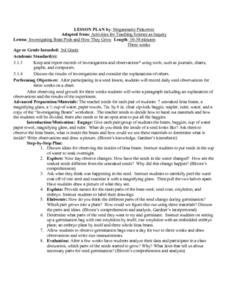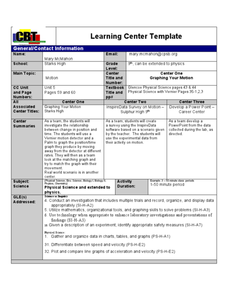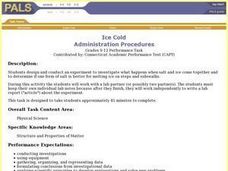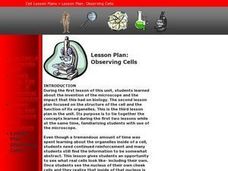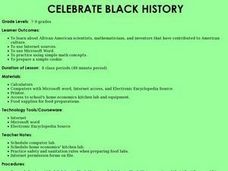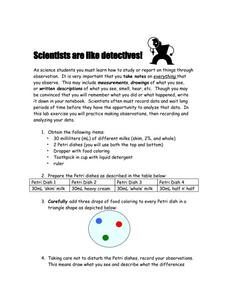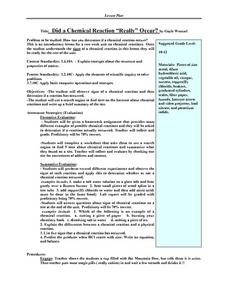Curated OER
Bacteria and their viruses
High schoolers listen and take lecture notes. They quietly watch a video on the bacteria and their viruses while taking notes on the video. They make 2 color drawings on blank paper, one showing a lytic virus and one showing a lysogenic...
Curated OER
How Does a Green Plant Grow?
Young scholars of all ages can explore the question "how do seeds grow?", design an experiment to answer the question, predict the outcome of the experiment then conduct the experiment.
Curated OER
Marine Environmental Geology
Students take this course as an introduction to the aspects of marine geology and oceanography that affect the environment and marine resources. Topics include estuarine oceanography and sediments, eutrophication of coastal waters,...
Curated OER
Investigating Bean Pods and How They Grow
Third graders observe and create a record of seed growth over time. After planting a seed, 3rd graders record their observations of the seed's growth over a three week period. Upon conclusion of the experiment, they write a paragraph...
Curated OER
Let's Rock
Students investigate the property of rocks and how to distinguish among the different types. They explore the hardness of rocks and perform streak tests to determine mineral color. They classify rocks according to their properties.
Curated OER
"Graphing Your Motion"
Students study the concepts of motion, velocity, and acceleration through graphing their own movement using LoggerPro. They explain the difference between speed and velocity using the weather vane example. They discover the difference...
Curated OER
Return Of The Living Dead
Students research endangered animal species that have 'beaten the odds' as they continue to survive longer than scientists had expected. They write individual pages for a class book about endangered species.
Curated OER
Naturally Disastrous!
Learners explore, research and examine the causes of natural disasters and how to survive them. They research on the internet world climate, recent disasters, how they happen, what to do if one occurs and what preventive measures to take...
Curated OER
Owls and Raptors
Young scholars dissect an owl pellet and identify its contents, after watching the teacher demonstrate the dissection process. Students record their findings on a graph.
Curated OER
Shells and Subshells
Students explore how to show evidence of subshells and electron filling on the visual scale. They examine subshell filling and evaluate unknowns based on the atomic emission spectrum. Students design an experiment to identify colors of...
Curated OER
Introduction to the Scientific Method
Students designs and conduct a scientific experiment that identifies the problem, distinguishes manipulated, responding and controlled variables, collects, analyzes and communicates data, and makes valid inferences and conclusions.
Curated OER
Heat Transfer
The students construct a heating curve and explain its components. They perform calculations. They review phase changes and quantify Energy differences. They review phases of matter and their energy content.
Alabama Learning Exchange
Amazing Adaptations - Probing Pinnipeds
Fourth graders collect data about the habitats of pinniped adaptations using digital probes. They determine how pinnipeds make adaptations to their natural environment by completing an experiment to determine how human and pinniped...
Curated OER
Ice Cold
Students design and conduct an experiment to investigate what happens when salt and ice come together and to determine if one form of salt is better for melting ice on steps and sidewalks.
Curated OER
The Three E's - Exciting Energetic Electrons
High schoolers perform flame tests on salts and record the electron configurations for various cations. They analyze and record the results using spectroscopes.
Curated OER
Celebrate Black History
Students research African-American mathematicians. In this middle school mathematics lesson, students celebrate Black History by conducting Internet research on an African-American, mathematicians or scientist. Students prepare a...
Curated OER
Types of Matter
Students analyze different types of matter according to its general and specific properties. They design an experiment to classify matter. Students are shown cornflakes and raisins. They are asked what type of substance is each...
Curated OER
Focus on Friction
The students learn about friction and forces through direct instruction and an investigation. They use measurement skills, observation skills, predicting, and drawing conclusions based on data collected during the investigation. Students...
Curated OER
Scientist Are Like Detectives
Students demonstrate proper scientific observation skills. In this investigative science lesson, students make observations, record their findings and form conclusions in order to improve their scientific documentation and writing skills.
Curated OER
Did a Chemical Reaction "Really" Occur?
Students perform several different experiments to observe signs of chemical reactions and determine if reaction has occurred, use search engine to find Internet sites pertaining to chemical reactions, and write up brief summary of site.
Curated OER
How Large is a Mole of M&M's
Students calculate whether or not a mole of M&M's fill their high school. They practice factor-labeling, define a mole, and calculate the number of cubic feet per mole of M&M's. To answer the question they measure and calculate...
Curated OER
High School Marine Science at its Best: Research Collaboration
Students formulate a more accurate understanding of the true nature of scientific research and the challenges and rewards of field investigations.
Curated OER
Simulation of Gene Splicing
Students simulate gene splicing by examining bacteria. They create a bacterial DNA into which they insert the human DNA (gene) that codes for growth hormone. They cut the sites of the enzyme to study how the human DNA can be joined to...





